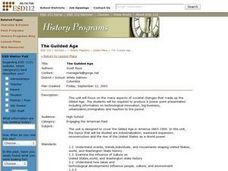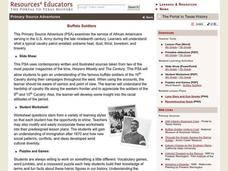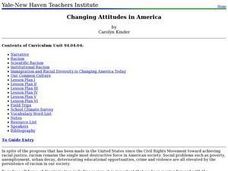Constitutional Rights Foundation
Naturalized Citizens and the Presidency
Article II, Section 1 of the U.S. Constitution takes center stage in a lesson that asks class members to assume the role of state senators, debate a resolution to amend the U. S. Constitution to permit naturalized citizens to run for...
Curated OER
My Secret War: Lesson 14
Fifth graders explore the civilian role during World War II. In this social studies lesson, 5th graders write an "I Am an American" poem from the perspective of various Americans during the war.
Curated OER
Voting and US Resident Aliens
Twelfth graders examine the process of voting. In this American Government lesson, 12th graders evaluate the arguments for and against alien voting. Students participate in a debate on voting rights.
Curated OER
"Exploring U.S. Motives Behind WWII Imprisonment and Deportation of German, Japanese, and Italian Latin Americans"
Students research and examine the secret Special War Problems Division program in Latin America and discuss the impact of the program on civil and human rights. They assess the motives for the program and explore various quotes from that...
Curated OER
The United Nations and Women
Students analyze the role of the Commission on the Status of Women in the post-WW II era by looking at the general framework the Committee worked within. They propose their own solutions to the case studies.
Curated OER
The Guilded Age
Learners examine the Gilded Age in American history. Using the internet, they research the innovations, business, and immigration during this time period. They create a PowerPoint presentation to share their information with the class.
Curated OER
Who Dropped What into the Melting Pot?
Young scholars show the movement of people to the United States from other countries on maps. They study the geographic cultural roots of foods that contribute to the melting pot of food in America. They research where an ingredient...
Curated OER
Buffalo Soldiers
Fourth graders explore the role of the buffalo soldiers in the United States Army during the nineteenth century conflict along the frontier with the Indian tribes. They discuss the social change represented by African Americans serving...
Curated OER
Treaties
Fifth graders investigate Canadian history by examining the alliances made in the past. In this Canadian treaties lesson, 5th graders identify the Native Americans of Canada, known as the First Nations people or Aboriginals. Students...
Curated OER
Digital Dreams
High schoolers write a speech. In this dreams lesson, students define the word dreams and list their own dreams. High schoolers read and discuss Langston Hughes work, read and discuss excerpts from speeches by JFK and Martin...
Curated OER
What Makes a Hero?
Here is a well-designed lesson inviting learners to consider the qualities of a hero. They describe the lives and deeds of national, state, and/or local heroes. This is a thoughtful lesson, which is part of a sequential group on heroes....
Curated OER
The Statue of Liberty: The Meaning and Use of a National Symbol
Engage your class in a series of activities, each related to the use or analysis of symbols used to convey patriotic or national concepts. They identify different national symbols and explain their meanings, discussing the importance of...
Curated OER
What is Suffrage? Understanding the Right to Vote
Students discover one of the restrictions forced on women of the early 1900s. In this civil rights lesson, students investigate suffrage and why women were not allowed to vote in the early twentieth century. Students create a mock...
Curated OER
The White Line - A One Act Play
High schoolers discuss amendments of the Constitution that cover due process and discuss them in relation to the play "The White Line". They determine how national security measures conflict with the issues of due process during wartime....
Curated OER
Coming to Terms: Stories of Southeast Asian Political Refugees
Eleventh graders examine the reasons why Southeast Asian refugees left their home for the United States. They conduct interviews and research their suffering and history. They examine primary source documents to better understand their...
Curated OER
Understanding Cultural Differences
Students listen to an interview and then write an essay about the life of people in the country as perceived by the person they interviewed.
Curated OER
Changing Attitudes in America
Pupils discuss strategies for confronting destructive stereotypes and mythologies, as well as promoting racial understanding in Students.
Curated OER
Ancient Greece: Inquiring Minds Want to Know
Second graders explore world history by writing newspaper articles. For this Greek history lesson, 2nd graders investigate the geography and society of Ancient Greece by utilizing the Internet as a research tool. Students collaborate...
Curated OER
Golda Meir: Israeli Political Leader
Students complete readings and mini-lectures to explore the life of Golda Meir, Israeli leader. They study her biography, discuss their research, write response journals and compare her government with its US counterpart.
Library of Congress
Child Labor in America
Students investigate child labor during the Great Depression. For this US policy lesson, students evaluate multiple layers of the social, economic, and political affects of policy during the Great Depression. Students will engage in 5...
The New York Times
Looking for Answers: Making Sense of the Boston Marathon Bombing
How should America respond to acts of domestic terrorism? What motivates or prompts a terrorist attack? After reading an opinion piece on the 2013 Boston Marathon bombing, your learners will critically analyze factors that could have...
Curated OER
Tracing Our Own Family Pilgrimages
Students observe a world map and are introduced to vocabulary like: cities, continents, rivers, lakes, and oceans. They discuss the names of the cities they live in and locate them on the map; then using a colored pushpin indicate: the...
Curated OER
Good Citizens
Students consider what qualities and values make a good citizen. Students compare the requirements to become a U.S. citizen in 1896 to current requirements. Students create a country and write out the qualities a good citizen would possess.
Curated OER
What Does It Mean To Be a Good Citizen?
Students study citizenship and what it means to be a good sitizen. They create their own country and determine its citizenship rules. They work together to create a visual representation of what makes a good citizen.

























